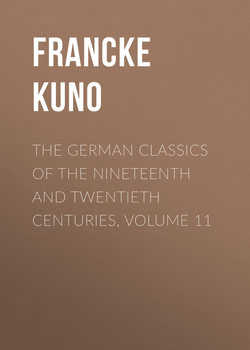The German Classics of the Nineteenth and Twentieth Centuries, Volume 11

Реклама. ООО «ЛитРес», ИНН: 7719571260.
Оглавление
Francke Kuno. The German Classics of the Nineteenth and Twentieth Centuries, Volume 11
EDITOR'S NOTE
THE LIFE OF FRIEDRICH SPIELHAGEN
FRIEDRICH SPIELHAGEN. STORM FLOOD1 (1877)
THE LIFE OF THEODOR STORM
THEODOR STORM. THE RIDER OF THE WHITE HORSE (1888)
TO A DECEASED2
THE CITY3
THE HEATH4
CONSOLATION5
WILHELM RAABE
THE HUNGER PASTOR
Chapter I
Chapter II
Summary of Chapters III, IV and V
Chapter VI
Summary of Chapter VII
Chapter VIII
Summary of Chapters IX and X
Chapter XI
Chapter XII
Summary of Chapters XIII, XIV, XV and XVI
Chapter XVII
Summary of Chapters XVIII-XXI
Chapter XXII
Chapter XXIII
Summary of Chapters XXIV to XXXIII
Chapter XXXIV
Chapter XXXV
Chapter XXXVI
Отрывок из книги
The struggle for liberal institutions, which found expression in the Wars of Liberation, the July Revolution of 1830, and the March Revolution of 1848 – with visions of a German Republic, with bitter protest against the Reaction, with a new hope of a regenerated social State and a renovated German Empire – marks only the stormy stages of the liberalizing movement which is still going on in the German nation. Since 1848, radical revolt has taken on forms very different from the dreams which fired the spirits of the Forty-eighters. The sword has yielded to the pen, the scene of combat has shifted from the arsenal and the battlefield to the printed book and the Council Chamber; while the necessity of an active policy of military defense has saved the German people from the throes of bloody internal strife.
In the transition from the armed revolutionary outbreak of 1848 to the evolutionary processes of the present day, the novel of purpose and of living issues (Tendenz-und Zeitroman) has played an important part in teaching the German people to think for themselves and to seek the highest good of the individual and of the classes in the general weal of the nation as a whole. In the front rank, if not the foremost, of the novelists of living issues in this period of social and economic reform was Friedrich Spielhagen, whose novels were almost without exception novels of purpose.
.....
"Is Antonio here, Miss Ferdinande?"
Ferdinande went herself to open the door.
.....